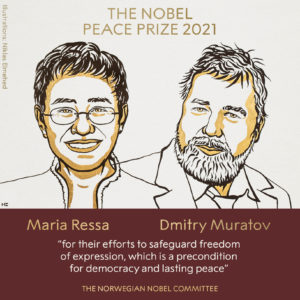 The OPC congratulates journalists Maria Ressa and Dmitry Andreyevich Muratov for receiving the 2021 Nobel Peace Prize for “their efforts to safeguard freedom of expression, which is a precondition for democracy and lasting peace.”
The OPC congratulates journalists Maria Ressa and Dmitry Andreyevich Muratov for receiving the 2021 Nobel Peace Prize for “their efforts to safeguard freedom of expression, which is a precondition for democracy and lasting peace.”
In a release announcing the award, the organization said that the two stand as representatives of all journalists who defend freedom of expression “in a world in which democracy and freedom of the press face increasingly adverse conditions.”
Ressa, the co-founder and head of Rappler, an investigative journalism website that has defended press freedom and endured relentless attacks from the regime of Philippine President Rodrigo Duterte for coverage of the country’s brutal anti-drug campaign and other abuses of power.
Muratov is co-founder of the independent Russian newspaper Novaya Gazeta and has been the paper’s editor-in-chief for a total of 24 years. Novaya Gazeta is a singular critical voice in Russia that the Nobel organization called “an important source of information on censurable aspects of Russian society rarely mentioned by other media.”
Watch a video recording of the announcement here.
Hear Ressa’s live reaction upon hearing the news from a Nobel official via a tweet here.
In an interview with Reuters in Manila, Ressa called the prize “a global recognition of the journalist’s role in repairing, fixing our broken world.”
“It’s never been as hard to be journalist as it is today,” Ressa said. “You don’t really know who you are until you are forced to fight for it.”
Muratov dedicated his award to six Novaya Gazeta contributors who were murdered for their work: Igor Domnikov, Yuri Shchekochikhin, Anna Politkovskaya, Stas Markelov, Anastasia Baburova and Natasha Estemirova.
“We will leverage this prize in the interests of Russian journalism which [the authorities] are now trying to repress,” Muratov was quoted as saying to news website Podyom.
Patricia Kranz, executive director of the OPC, said Shchekochikhin was a frequent visitor at the Moscow bureau of BusinessWeek magazine when she worked there in the 1990s. “He would come over to swap information about corrupt bureaucrats and business people in Yeltsin’s Russia,” she said. “He was a relentless reporter who was not afraid to follow the facts wherever it led him, no matter how dangerous.”
Kranz was one of the judges who awarded Anna Politkovskaya the OPC’s Artyom Borovik Award for her reporting in Novaya Gazeta in 2000. “Every journalist in Russia, expats and Russians alike, were in awe of Anna’s bravery reporting the truth about the situation in Chechnya, despite numerous threats,” she said.
